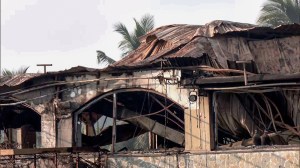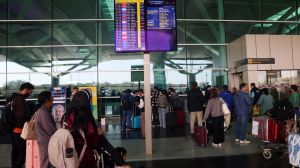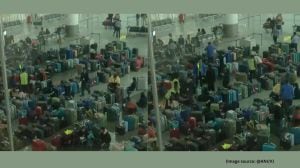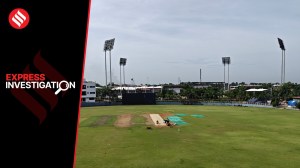Stay updated with the latest - Click here to follow us on Instagram
Israeli strikes kill Islamic Revolutionary Guard Commander as explosions rock Tehran
Alongside Major General Hossein Salami, reports cite that Iran’s military chief Mohammad Bagheri, two senior nuclear scientists, and other top commanders were also likely killed in the strikes.
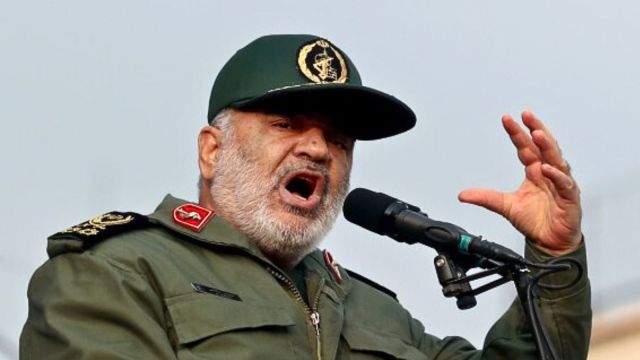 According to Iranian state media, Salami was killed in a direct hit on the IRGC headquarters in Tehran. (AP Photo)
According to Iranian state media, Salami was killed in a direct hit on the IRGC headquarters in Tehran. (AP Photo)Major General Hossein Salami, commander-in-chief of Iran’s Islamic Revolutionary Guard Corps (IRGC), was confirmed dead after a wave of Israeli airstrikes hit Iran early Friday. According to Iranian state media, Salami was killed in a direct hit on the IRGC headquarters in Tehran — marking one of the most significant escalations in the region in decades.
Tasnim, a semiofficial news site affiliated with the Iranian government, reported that alongside Salami, at least three other senior Iranian leaders are thought to have been killed.
According to The Associated Press, multiple explosions were heard across Tehran and other cities. Israeli Prime Minister Benjamin Netanyahu confirmed that the strikes targeted Iran’s main nuclear enrichment site.
“We struck at the heart of Iran’s nuclear enrichment program. We struck at the heart of Iran’s nuclear weaponization program. We targeted Iran’s main enrichment facility in Natanz. We targeted Iran’s leading nuclear scientists working on the Iranian bomb.”
Footage aired on Iranian state TV showed buildings still ablaze in the Mahalati complex — a residential area housing senior military commanders.
Israel cites ‘imminent threat’
Speaking in a public address, Netanyahu said the strikes were necessary to stop Iran from acquiring a nuclear weapon. “The attacks will continue for as many days as it takes to remove this threat,” he said in a video statement.
Israeli Defense Minister Israel Katz also confirmed the strike:
“In the wake of the state of Israel’s preventive attack against Iran, missile and drone attacks against Israel and its civilian population are expected immediately,” Katz said in a statement. He signed a special order declaring an emergency on the home front and advised citizens to follow safety instructions.
Israel has since closed its airspace, as have Iran and neighboring Iraq, in anticipation of further escalation.
Iran vows retaliation
Brigadier General Abolfazl Shekarchi, spokesperson for Iran’s armed forces, issued a direct warning via state TV. “Israel and the United States will pay a heavy price,” he said, as reported by Reuters.
Iranian leadership has not disclosed its next military steps, but reports suggest preparation for a possible retaliatory strike is underway.
US distances itself, warns Iran
The Trump administration, which had earlier advised restraint, denied involvement in the strikes. Secretary of State Marco Rubio said, “We are not involved in strikes against Iran, and our top priority is protecting American forces in the region.” Rubio added that Israel acted unilaterally and had cited “self-defense” as its justification.
President Donald Trump, who had urged Israel to delay the operation to keep diplomatic talks with Tehran alive, was seen greeting members of Congress on the White House lawn as news of the strikes emerged. It remains unclear when he was officially briefed.
Why the conflict?
This latest escalation follows a resolution by the International Atomic Energy Agency’s (IAEA) Board of Governors, which formally censured Iran on Thursday for failing to cooperate with nuclear inspectors — the first such censure in 20 years.
In response, Iran announced plans to establish a third uranium enrichment site and upgrade its centrifuges.
While Iran insists its program is for civilian purposes, Israel and the US believe Tehran is inching closer to nuclear weapons capability. The Associated Press reports that Iran could theoretically build multiple warheads within months, though US intelligence agencies maintain that no weapons program is active at this time.
(With inputs from The Times of Israel, AP, Reuters, Tasnim news agency)
- 01
- 02
- 03
- 04
- 05








